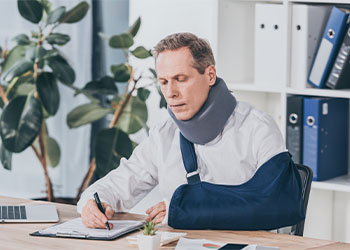Dos and Don’ts After an Injury
July 23, 2024
 If you have suffered an injury—major or minor—knowing what to do immediately afterward can make a world of difference in your recovery process and legal options. As an attorney who has been practicing since 2016, I can provide some important dos and don'ts and practical tips to help you survive the aftermath of an injury.
If you have suffered an injury—major or minor—knowing what to do immediately afterward can make a world of difference in your recovery process and legal options. As an attorney who has been practicing since 2016, I can provide some important dos and don'ts and practical tips to help you survive the aftermath of an injury.
Do This After an Injury
Here are a few things you should do if you're injured:
See a Doctor
After sustaining an injury, your primary focus should be getting immediate medical attention. The injury may appear minor initially, but symptoms can escalate over time. A professional diagnosis gets you the appropriate treatment and establishes a medical record, which can support potential legal claims.
Document Your Injuries
Your medical reports can be critical evidence in a personal injury case, should you decide to file one. They provide a detailed overview of your condition, treatment plan, and recovery progress. Follow your doctor's advice and attend all appointments to maintain a consistent medical record.
Avoid Self-Diagnosis
Resist the temptation to self-diagnose or downplay your injury. Doing so could aggravate your condition, delay proper treatment, and weaken your legal case. Let a medical professional make an accurate diagnosis and determine the best course of action for your recovery.
Record the Scene of the Injury
Use your phone to take pictures and videos from different angles. Capture relevant details, such as hazardous conditions, vehicle damage, or visible injuries. If you can't, ask a witness or bystander for help. This documentation can support your version of events and help establish liability.
Gather Witness Information
If there are witnesses, collect their names and contact information. Witness statements can help establish the facts of the incident and support your claims. If your injuries prevent you from doing so, ask a trusted friend or family member for help.
Do Not Rely Solely on Memory
Memories can fade or become distorted over time. Write down everything you remember about the incident as soon as possible. This written account will be more reliable than your memory alone and can help your attorney in building a strong case.
Report the Accident
If your injury occurred in a public place, such as at work or on someone else's property, report the accident to the appropriate authority. In some cases, failure to report the incident in a timely manner may weaken your legal claim.
Consult an Attorney
Consult with a personal injury attorney if you have been seriously injured. They can help you understand your legal options and protect your rights throughout the process. Do not agree to a settlement or sign any documents before consulting your attorney.
Don't Do This After an Injury
Here are a few things you should not do if you're injured:
Don't Discuss the Incident Publicly
Avoid discussing your injury with anyone other than your attorney, doctor, or immediate family. Anything you say on social media or anywhere else could be used against you in a legal case.
Don't Delay Medical Treatment
Delaying medical treatment can worsen your condition and undermine a potential legal claim. Insurance companies may argue that your injuries may not be severe if you did not seek immediate medical care.
Don't Sign Anything Without Legal Advice
Do not sign any documents from insurance companies or opposing parties without first consulting your attorney. You may inadvertently agree to terms that are not in your best interests.
Don't Admit Fault
Avoid making statements that could be interpreted as admitting fault. Even a simple apology can be misconstrued and used against you in legal proceedings.
Don't Forget to Follow Up
Missing medical appointments or failing to follow prescribed treatments can harm your recovery and weaken your legal case. Consistent follow-up shows that you are taking your injuries seriously.
Don't Dispose of Evidence
Do not throw away items that may serve as evidence, such as damaged clothing or equipment involved in the injury. These can help establish the facts of your case.
Don't Settle Too Quickly
Insurance companies may offer a quick settlement to avoid paying larger claims later. Do not rush into a settlement without fully understanding the extent of your injuries and consulting with your attorney.
Don't Hide Prior Injuries
Concealing previous injuries or medical conditions can damage your credibility and legal case. Insurance companies may use any inconsistencies to challenge your claims, so be honest with your attorney and healthcare providers.
Injury Laws in Texas to Be Aware Of
If your injury took place in Texas, here are a few laws you should be familiar with:
Statute of Limitations
In Texas, the statute of limitations for personal injury claims is generally two years from the date of the injury. Failing to file within this timeframe can bar you from seeking compensation.
Comparative Negligence
Texas follows a "modified comparative negligence" rule. This means you can recover damages even if you are partially at fault for the incident if your fault does not exceed 50%. However, your compensation will be reduced by your percentage of fault.
Reporting Requirements
Certain types of injuries, such as those from car accidents, must be reported to the police. Failing to do so can complicate your legal case and might result in penalties.
Contact an Injury Lawyer Today
If you're dealing with personal injury or other legal issues in McAllen, Edinburg, Mission, or Rio Grande Valley, The Law Office of Aaron Fonseca is here to help. I have been providing top-notch representation in personal injury, criminal defense, and family law since 2016. Call my firm in Texas today to schedule a consultation and enlist personalized legal advice and dedicated support.

